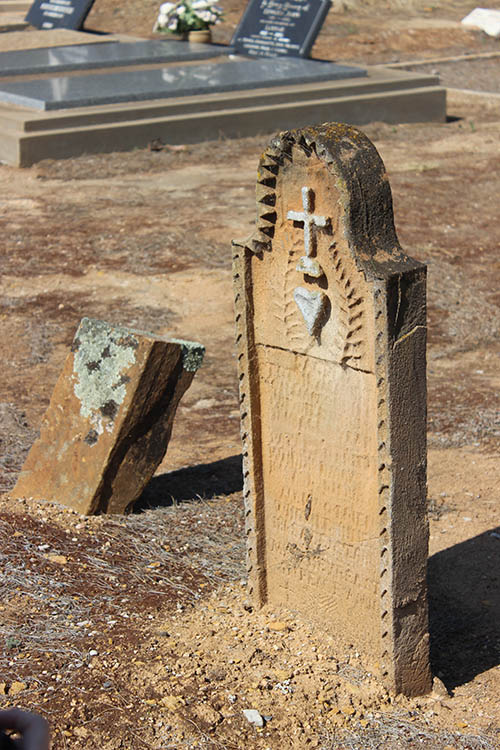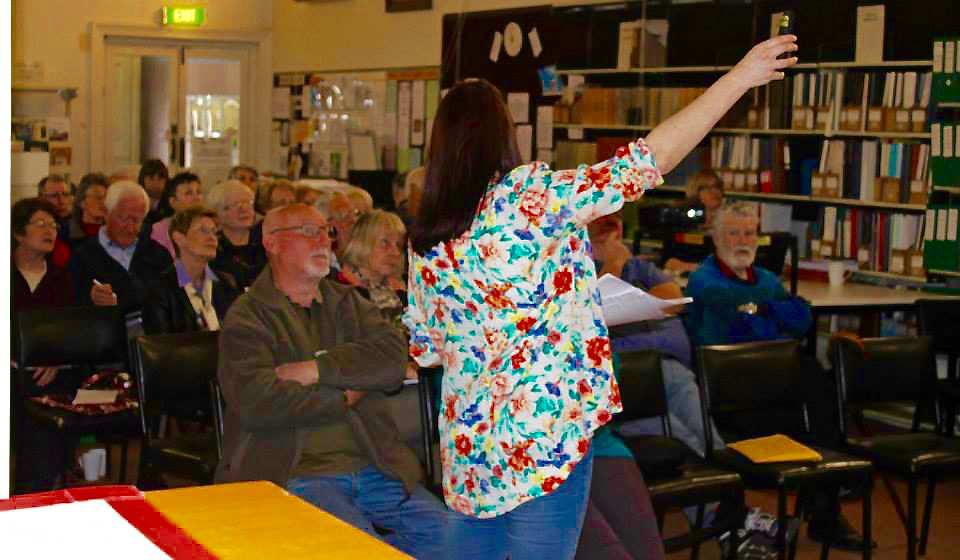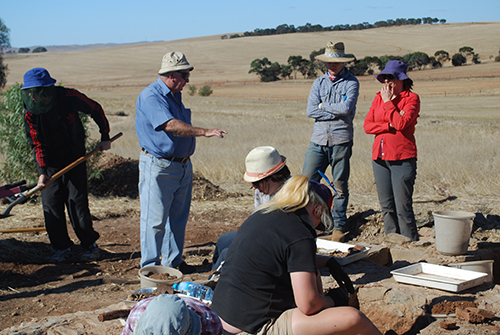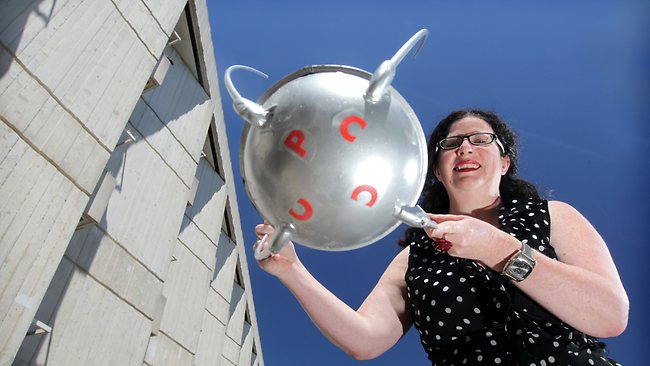Research Engagement and ImpactWhat does engagement look like? Community-initiated research.

The Departments of History and Archaeology are thinking about engagement. In 2017, the Field of Research code 21 History and Archaeology will be submitted for the Australian Research Council’s Pilot Engagement Study.
The pilot aims to examine how universities are translating their research into economic, social and other benefits and encourages greater collaboration between universities, industries and other end-users of research.
The ARC defines research engagement as:
'the interaction between researchers and research end-users (including industry, government, non-governmental organisations, communities and community organisations), for the mutually beneficial exchange of knowledge, technologies and methods, and resources in a context of partnership and reciprocity’
Much of the research in the Department of Archaeology is initiated by community groups, government departments and other end-users. People regularly approach us to record historic shipwrecks, identify the graves of their relatives, record Aboriginal rock art and excavate under the floor boards of historic buildings.
For archaeology, engagement is less about researchers engaging with the community than the community engaging with researchers.
The Department of Archaeology receives around one community request per month. Many of these are translated into student research projects, Archaeology Society training exercises, field schools or voluntary projects undertaken by staff members. Many of the contacts made by communities are the result of media coverage of our research and our web presence.



Sometimes engagement is a single project. This may involve recording a cemetery, assisting with the digitisation of the records of a local museum or excavating an air raid shelter.
Sometimes engagement is a long-term relationship. These research partnerships can last for decades. Claire Smith has worked with the Barunga community in the Northern Territory since 1990 and Ngadjuri people since 1998. Associate Professor Amy Roberts conducted her Honours research with the Mannum community in 1998 and still works with this community. Similarly, Dr Mick Morrison is still conducting research with the Aboriginal people in west Cape York whom he first worked with in 2000. DECRA Fellow Dr Daryl Wesley has worked with Aboriginal people from Western Arnhem Land, Northern Territory, since 1991.
Among other things, community-initiated research has the capacity to significantly increase Flinders University’s public profile. Heather Burke’s research in 2011 and 2012 with the Catholic Church, the Sisters of Saint Joseph and the Mary Mackillop Penola Centre sought to locate the stable school where Mary Mackillop founded the Sisters of Saint Joseph. This research generated more than 65 media interviews, including television segments with WIN 9, National 9 News and Channel 10 News.
Dr Alice Gorman’s research on space archaeology and space junk has led to her playing a leading role in the Space Industry Association of Australia, which in 2017 is hosting the world’s largest space gathering, the International Astronautical Congress, in Adelaide. In this capacity, she has been invited to mentor small satellite start-up companies in Melbourne and New Zealand and to collaborate with lunar research teams in India.
Most importantly, community-initiated research points to both the needs and wants of local communities.
Often, people identify research opportunities but don’t have the capacity or the specialist knowledge to take advantage of these themselves. They seek support from the University as a regional authority and archaeology as a specialist discipline. If the archaeologist takes on the research the community may provide small amounts of funding and/or in-kind support for the research. Sometimes the community may seek funding for a longer-term project. Sometimes they will co-fund or co-host a workshop or symposium, co-present at a conference or co-author a publication or other product. These activities produce a wide variety of output from research undertaken on the basis of a ‘mutually beneficial exchange of knowledge, technologies and methods, and resources in a context of partnership and reciprocity’ (ARC 2017:11).
Article provided by Professor Claire Smith and Associate Professor Heather Burke, Department of Archaeology
Reference
Australian Research Council 2017 Engagement and Impact Assessment Pilot 2017. Submission Guidelines. Available at http://www.arc.gov.au/engagement-and-impact-assessment
More posts in "Research Engagement and Impact" series:
- (13 Dec 2018) ECR Spotlight - Dr Ben Lewis
- (29 Nov 2018) Impact Seed Funding – supporting our Flinders ECRs – Dr David Smith
- (29 Nov 2018) Research Roundup - 29 November 2018
- (15 Nov 2018) Impact Seed Funding – supporting our Flinders ECRs – Dr Lua Perimal-Lewis
- (14 Nov 2018) Research Roundup - 15 November 2018
- (01 Nov 2018) Flinders research from an undergraduate class to a record breaking swim attempt
- (01 Nov 2018) Research Roundup - 1 November 2018
- (31 Oct 2018) ECR Spotlight - Dr Bev Rogers
- (31 Oct 2018) Flinders researchers trip to Germany on bringing science to market
- (18 Oct 2018) Melbourne and Canberra fellowships advance research and leadership skills for Flinders researcher
- (18 Oct 2018) Impact Seed Funding – supporting our Flinders ECRs - Dr Linlin Ma
- (18 Oct 2018) Research Roundup - 18 October 2018
- (04 Oct 2018) How can Australian innovation create new industries and jobs?
- (04 Oct 2018) Research Roundup - 4 October 2018
- (27 Sep 2018) Saving Nemo at Ngeringa Winery
- (20 Sep 2018) Assisting the UN and developing nations on how to measure wellbeing
- (20 Sep 2018) Equity Hub to assist translating research into change
- (06 Sep 2018) Steps to improve gender diversity in coastal geoscience and engineering
- (23 Aug 2018) Finding the invisible traces
- (09 Aug 2018) Diving in Deep to strengthen links with UNESCO members
- (09 Aug 2018) Impact Seed Funding – supporting our Flinders ECRs
- (09 Aug 2018) Older Adults engaging for a better quality of life
- (08 Aug 2018) The scientist’s guide to a successful career in academia
- (27 Jul 2018) Flinders aiming to lead the blueeconomy
- (27 Jul 2018) Can you have a conversation with a computer?
- (12 Jul 2018) Flinders linking with arts and culture to explore their real value
- (12 Jul 2018) WHO internship for Flinders researcher
- (28 Jun 2018) Flinders linkage grants success
- (28 Jun 2018) Flinders’ led project top in Radiation Research
- (18 Jun 2018) Nothing going to waste - Flinders NIH Success
- (18 Jun 2018) ECR Spotlight - In Conversation with Dr Sam Elliott
- (29 May 2018) Flinders leading the reviews to improve remote health
- (17 May 2018) Generating conversation through The Conversation
- (15 May 2018) ECR Spotlight - Dr Ashok Manoharan 2018
- (03 May 2018) Flinders’ Archaeologist off to Cambridge for a year
- (26 Mar 2018) New chapter of Indigenous history told through food
- (08 Mar 2018) Flinders linking with Indigenous groups to explore aspects of colonial Australia
- (22 Feb 2018) ECR Spotlight - Ian Moffat
- (21 Feb 2018) Flinders working to Beat Cancer
- (25 Jan 2018) Why are little penguins declining?
- (25 Jan 2018) Scimex - Register now to be a part of breaking news
- (24 Jan 2018) ECR Spotlight - Alice Clement
- (21 Dec 2017) A Flinders first - automated launch and recovery for autonomous underwater vessels
- (13 Dec 2017) 2017 Vice-Chancellor's Award for Early Career Researchers
- (11 Dec 2017) ECR Spotlight - Vishnu KK Nair
- (06 Dec 2017) NHMRC success for Flinders
- (24 Nov 2017) Aiming to improve the health, education and wellbeing of children
- (17 Nov 2017) Accelerating the Interplay Wellbeing Framework
- (16 Nov 2017) 2018 Visiting International Research Fellows to Flinders
- (15 Nov 2017) ECR Spotlight - Ashokkumar Manoharan
- (15 Nov 2017) 2018 Flinders Endeavour Scholars and Fellows announced
- (14 Nov 2017) Time to Bragg about science writing
- (10 Nov 2017) Flinders Forensic Science cleans up at Awards
- (10 Nov 2017) Flinders successes in the recent ARC grant round
- (30 Oct 2017) Students Present Around the World
- (20 Oct 2017) Over $8 Million to Flinders from the National Palliative Care round
- (19 Oct 2017) ECR Spotlight - Sam Schultz
- (17 Oct 2017) Flinders' Fresh Scientists in the Pub
- (11 Oct 2017) Indigenous knowledge, not just for Indigenous communities
- (06 Oct 2017) Leading Drug and Alcohol researchers at Flinders’ NCETA secure $1.7 million in funding
- (05 Oct 2017) ECR Spotlight - Margaret Shanafield
- (28 Sep 2017) Our Distinguished Geographer
- (07 Sep 2017) ECR Spotlight - George Karpetis
- (01 Sep 2017) Eureka! Prize for blood test for bowel cancer recurrence
- (22 Aug 2017) Different environments, different DNA, different dolphins?
- (17 Aug 2017) ECR Spotlight - Dr Harriet Whiley
- (03 Aug 2017) ECR Spotlight - Giselle Rampersad
- (17 Jul 2017) Time to Scope your research - FAST
- (17 Jul 2017) Time to Scope your research - Hoverflies
- (13 Jul 2017) Tips from a first time interviewee
- (12 Jul 2017) Saving Nemo at the Star of Greece
- (07 Jul 2017) Invasion of the European crabs
- (20 Jun 2017) Fossil finds bring Australia's evolutionary history to life
- (07 Jun 2017) Peer Prize up for grabs
- (02 Jun 2017) Tracking the marine ecosystems in South Australia
- (29 May 2017) Be Your Best for Impact
- (18 May 2017) Aiming to catch criminals as never before
- (05 May 2017) Excavating with and in a Community
- (29 Apr 2017) What does engagement look like? Community-initiated research.
- (24 Apr 2017) Planning for one of the world’s youngest nations
- (07 Apr 2017) Pitching ON tasty seaweed jelly
- (29 Mar 2017) Best and Brightest for Hearts
- (27 Mar 2017) The Best Student Publications - Flinders 2016 edition
- (16 Mar 2017) From workshop to book - Underwater archaeology and 3D
- (21 Dec 2016) Recent Funding Success
- (21 Dec 2016) Research Impact - Point of Care Testing
- (21 Dec 2016) New ARC College of Experts
- (20 Dec 2016) Flinders Celebrates - 2016 Research Successes
- (19 Dec 2016) Vice-Chancellor Awards for Research Excellence
- (19 Dec 2016) Cardiology, Mental Health Projects among NHMRC Grant Success


Comments
Comment preview